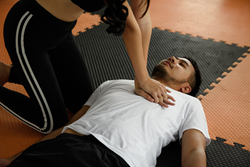Thousands More Lives Could Be Saved Each Year If More People Understood Sudden Cardiac Arrest and the Need for Immediate Bystander Intervention

Sudden cardiac arrest leads to death in minutes if the person does not get help right away. Survival depends on people nearby calling 911, starting CPR and using an AED right away.
A national messaging study conducted for the Sudden Cardiac Arrest Foundation by consumer research firm StrataVerve has found that understanding the critical nature of sudden cardiac arrest (SCA) drives bystander action to give CPR and apply an AED (automated external defibrillator)—actions that can make the difference between life and death. Exposure to a lay-friendly definition of SCA [1] significantly increases the number of people “very likely” to give CPR or apply an AED in an emergency, which could save thousands more lives each year. The research was presented at the American Heart Association’s Resuscitation Science Symposium 2018, an international conference highlighting the best in cardiovascular resuscitation research.
Sudden cardiac arrest is a public health crisis. More than 356,000 cardiac arrests occur outside hospitals annually in the U.S., nearly 90 percent of them fatal. Survival depends largely on immediate bystander intervention with CPR and the use of AEDs. However, less than 4 in 10 victims receive bystander CPR, and less than 2 in 10 victims are treated with AEDs by bystanders before EMS arrives. Bystander CPR can triple survival, and bystander AED use is associated with better survival and functional outcomes.
An earlier baseline study conducted for the Sudden Cardiac Arrest Foundation by StrataVerve found low public awareness and understanding of SCA, CPR and AEDs, resulting in considerable confusion. This high level of confusion drives unintentional public apathy with deadly consequences. The goal of this follow-on study was to determine ways to improve the public’s understanding of SCA and to develop messaging that best motivates bystanders to act quickly in sudden cardiac emergencies.
“The public is currently confused about sudden cardiac arrest,” said Jennifer Chap, principal, StrataVerve. “As a cause we must connect the dots for the public, taking a potential lay rescuer from the current state of confusion to awareness, understanding and belief—before we can get the bystander to act.” Chap, a consumer research and marketing expert, saved her husband Rick’s life with dispatch assisted CPR in 2012.
The research method included an online quantitative survey among a representative national sample of 2,232 adults and a 20-minute in-person qualitative interview among 20 adults from 10 states.
Upon exposure to a peer-reviewed, lay-friendly definition of sudden cardiac arrest [1], 26% more respondents indicated they would be “very likely” to give CPR and 38% more respondents said they would be “very likely” to apply an AED. When the bystander CPR increase factor is applied to 2017 data from CARES (Cardiac Arrest Registry to Enhance Survival), an additional 13.7% who suffer SCA outside hospitals could survive to hospital discharge. This means thousands more lives could be saved each year simply because people understand SCA and the importance of bystander intervention.
Another part of the research exposed respondents to 11 discrete messages, developed in partnership with the National Cardiac Arrest Collaborative. Messages were designed to grab attention and motivate bystanders to give CPR and apply AEDs. Two messages resonate strongly with the public on both rational and emotional levels. The impact that CPR has on tripling survival and the fact that SCA could happen to a loved one at home are the strongest motivators.
The study team concluded that adopting a universal lay-friendly definition of sudden cardiac arrest and leveraging tested key messages across heart-related organizations could educate the public and move the public to action. These efforts could help save thousands more lives from sudden cardiac arrest annually in the U.S.
“It is vitally important that heart-related organizations collaborate and speak in one voice to raise awareness and understanding about sudden cardiac arrest,” said Mary M. Newman, MS, president of the Sudden Cardiac Arrest Foundation. “Simply by using the same definition of SCA and the same talking points, we can save thousands more lives each year.”
[1] DEFINITION: Sudden cardiac arrest is a life-threatening emergency that occurs when the heart suddenly stops beating. It strikes people of all ages who may seem to be healthy, even children and teens. When SCA happens, the person collapses and doesn't respond or breathe normally. They may gasp or shake as if having a seizure. SCA leads to death in minutes if the person does not get help right away. Survival depends on people nearby calling 911, starting CPR and using an AED (if available) as soon as possible.
About the Sudden Cardiac Arrest Foundation The Sudden Cardiac Arrest Foundation is a national community benefit 501(c)(3) organization dedicated to raising awareness about sudden cardiac arrest and saving lives. Programs include the Sudden Cardiac Arrest Network, an online community that provides peer support and opportunities for survivors and family members to participate in awareness, advocacy, and research initiatives.
About StrataVerve StrataVerve is a strategic marketing and research firm with expertise in consumer insights, product development and brand strategy across multiple categories. The StrataVerve difference is an integrated, analytic decision-driven approach that turns research findings into consumer action.
Story Credit: https://www.prweb.com/releases/thousands_more_lives_could_be_saved_each_year_if_more_people_understood_sudden_cardiac_arrest_and_the_need_for_immediate_bystander_intervention/prweb15921208.htm
Since you’re here, we have a small favor to ask. Requests from schools and districts for our screening services are growing, which means that the need for funds to cover the cost of those services is also growing. We want to make our services available to those who request it and beyond, so you can see why we need your help. Safebeat heart screenings take a lot of time, money, and hard work to produce but we do it because we understand the value of a child's life, PRICELESS!
If everyone who reads this likes it and helps fund it, our future would be more secure. For as little as $1, you can support Safebeat and it only takes a minute. Make a contribution. -The SafeBeat Team


